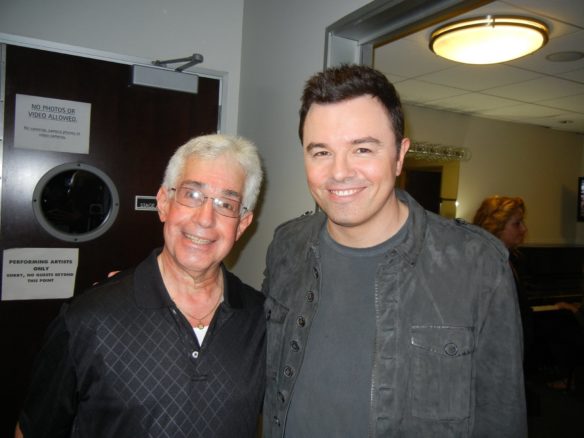
By Steve Vertlieb: While I’ve spent much of my seventy-six years purchasing and perusing TV Guide Magazine, and subscribing to their editorial opinions as “industry gospel,” I must vehemently part company with the opinions of their editorial board and take issue with their condemnation of the third season premiere of The Orville. Having been on hiatus for several years, moving from Fox to Hulu and laboriously filming new episodes of the series for the popular streaming service, the editorial writers for the venerable television publication condemned the premiere episode of The Orville: New Horizons for its “joyless season opener.”
It is true that Seth MacFarlane, the veteran satirist who both created and stars in the science fiction series, originally envisioned the program as a semi-comedic tribute to Gene Roddenberry’s venerable Star Trek. However, the show grew more dramatic in its second season on Fox, while it became obvious that MacFarlane wished to grow outside the satirical box and expand his dimensional horizons and ambitions.
Consequently, the long awaited third season of The Orville opened its premiere episode with a heartfelt salute to comic Norm Macdonald who had played the voice of a gelatinous member of the ship’s crew, and had sadly passed away from cancer during the show’s hiatus.
MacFarlane has long aspired to escape the self imposed boundaries of his satiric origin, and tackle more serious issues, much as his science fiction series has gradually escaped the limitations of time and space. Its season premier, “Electric Sheep,” dealt with the theological morality of an artificial intelligence deciding to take its own life for the imagined betterment of the ship’s crew, and of mankind. Mark Jackson as “Isaac” had betrayed his fellow crew members in the second season finale and gone, if you will, to “The Dark Side.” His suicidal redemption was, in a sense, an act of nobility and self sacrifice on behalf of his betrayed crew mates.
Seth MacFarlane has shown his adaptability as a creator and performer, as well as his growth and maturity as an artist. This remarkably talented writer, director, comedian, actor, and voice-over artist is also a wonderfully gifted interpreter of “The Great American Songbook.” In a delightful two hour concert at The Mann Music Center in Philadelphia during the Summer of 2014, he performed a heartfelt selection of classic Nelson Riddle/Frank Sinatra charts with amazing grace and definitive vocal prowess, leaving the packed outdoor theater’s audience screaming for more. He literally came back for something like six encores, all to the delight of everyone fortunate enough to have been in attendance.
I first encountered Seth’s beautiful voice and charming performance skills a year earlier when he appeared as the featured vocalist during a splendid John Williams concert at The Hollywood Bowl where I was honored to actually meet and speak with him back-stage after the performance. In a multi-national musical climate where mediocrity is passionately applauded and embraced, Seth MacFarlane (whose adoration of Francis Albert Sinatra, and his legacy is clearly and joyfully evident), along with his deeply personal musical persona, and sublime transformation, is like a swirling, exhilarating breath of fresh air. This was fine wine waiting to be tasted, savored, and cherished well into the gentle conclusion of a warm, romantic Summer’s evening.
In much the same spirit as his maturity has grown as a popular singer, MacFarlane’s aspirations as a serious writer and actor seem to have blossomed on his popular science fiction series. Its third season opener provided a somber, sobering look at suicide and the consequences of life taken both willingly and prematurely. The Orville has grown and matured beyond its humble, satiric beginnings and evolved into a more daring, provocative journey to worlds beyond imagining. For this valiant journey and adventure, Seth MacFarlane and his crew must be applauded.

Discover more from File 770
Subscribe to get the latest posts to your email.

I liked the third season premiere too, and the most recent two episodes were very good as well.
While the 3rd season premier was quite dark, and I am suspicious of suicide in general, I thought the episode was brilliantly written and portrayed the run-up, decision and aftermath of Isaac’s suicide beautifully. It made you think, whatever your opinions on suicide might be.
We have been enjoying the more dramatic transformation of The Orville very much. I also like the many insider references to Old Earth pop music. 🙂
I don’t think it was the second season finale. Episodes 7 and 8 of 12, I think?
While I agree that Mr. MacFarlane has every right (and, indeed, my encouragement, for whatever that’s worth) to move Orville away from satire, and into more serious material, I do not think this season premiere accomplished that. It was scary dull. Some characters (mostly straw dogs) had problems. Then everybody talked a lot. Nothing was actually accomplished, but, hey, they all made peace with each other in the end. There are more sophisticated means of addressing serious problems than everybody talking too much. Even satire can do a better job of it.
The Orville new horizon was taped months earlier and the subjects are right up to date. I have told family and friends to watch this show. Been watching The Orville since it was on fox. They done some star trek similar episodes and different outcomes. Great season, can’t wait for the next episode.
There is a shift in tone mostly because they just barely survived a war with the Kaylons(and are still a threat) and the characters are still dealing with their grief and anger over what happened. Silliness may return in time, but not right away. I seem to recall in ST:TNG how quickly they would swing from smiling and having a bit of fun to seriousness when threats occurred. This is how real people react to threats and trauma.